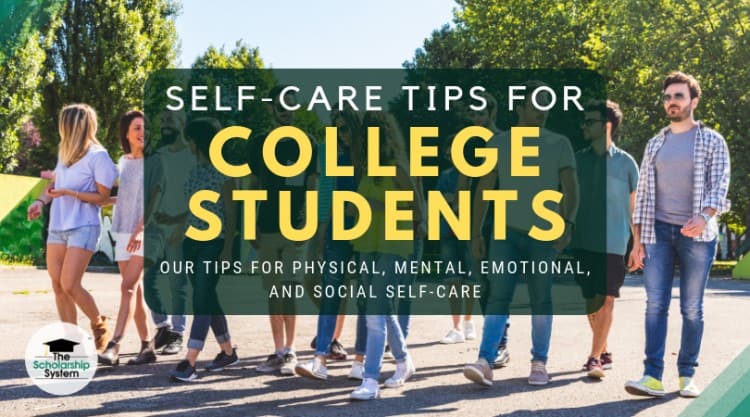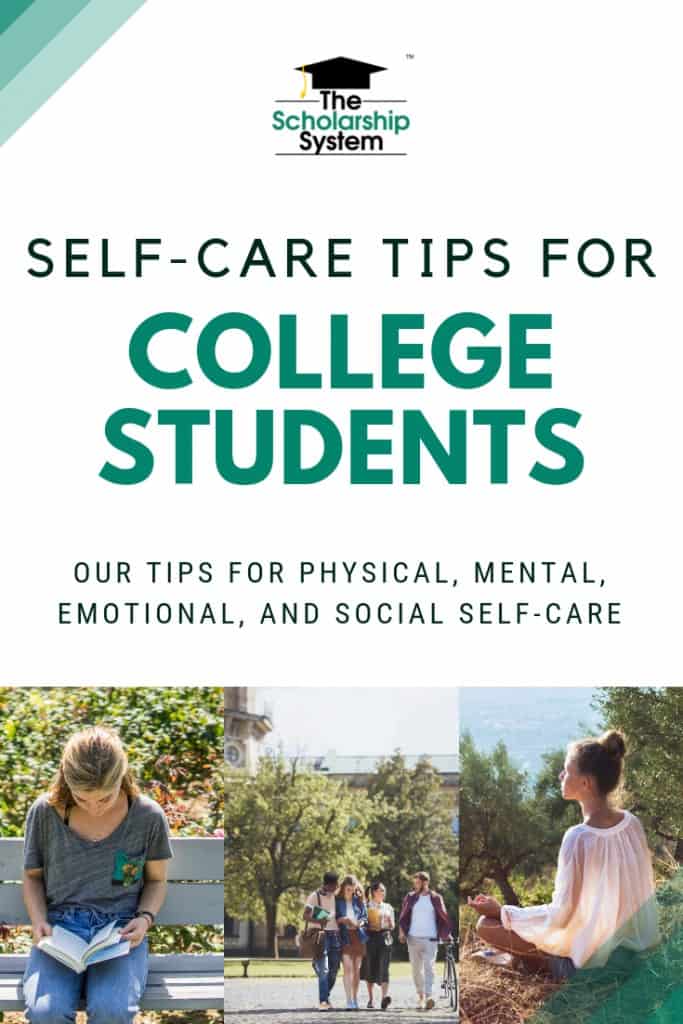Updated on March 24th, 2021
Self-care sounds simple on the surface. However, many college students struggle with finding the time to prioritize their needs. Instead, they focus on academics, extracurriculars, work, and other demands they must manage, causing them to put aside any self-care tips for college students they may know or otherwise neglect themselves.
Self-care can be critical for student mental health. It ensures they are taking time to focus on their needs, ranging from staying healthy to finding time for relaxation and enjoyable activities.
If you are wondering why it is so important and what self-care tips for college students you should share with your student, here’s what you need to know.
If you and your student want to learn more about where to find scholarships and how to handle the scholarship process, sign up for our free college scholarship webinar! Go to https://thescholarshipsystem.com/freewebinar to secure your spot today.
Contents
Mental Health and College Students
College student mental health statistics paint a dire picture. Between 2009 and 2015, anxiety treatment and diagnosis among college students increased by almost 6 percent. For depression and panic attacks, the numbers went up by around 3 percent.
Anxiety is estimated to affect nearly 15 percent of all college students. However, those numbers could be low, as not all college students seek a diagnosis or treatment. For example, one survey indicated that 57 percent of female college students and 40 percent of male college students felt episodes of “overwhelming anxiety” during the past year. In the same survey, 33 percent of women, along with 27 percent of men reported at least one period where they were so depressed it was challenging to function.
Mental health in college students is critical, and not just for their academic success. If their mental health is compromised, the effects can be damaging or even deadly.
Regretfully, there is still a stigma surrounding mental health, including at college campuses. While a higher percentage of college students seek help today than in previous decades, not all do. Even as everyone becomes more aware of potential issues students may face, some students are fearful about being judged or not being taken seriously if they come forward. This can lead a problem to go unaddressed, giving it the ability to grow and compound over time.
If your student is struggling with mental health, it is always best to seek assistance from a medical professional. They can offer guidance, provide a diagnosis, and form a treatment plan that can help. Often, this includes self-care tips for college students that can lessen symptoms, though may consist of additional support and approaches that only a medical professional can provide.
If your student simply wants to manage stress and ensure they can maintain their well-being while at school, self-care can help. Here’s a look at what you need to know about self-care.
What is Self-Care?
Self-care is typically viewed as a simple break from the every day; a moment where a person can focus on something they enjoy. However, it is actually a bit more involved.
A better way to view self-care would be as a continuous process. It is a set of activities that maintain physical, mental, and emotional well-being. Typically, self-care needs to be ongoing to be effective.
When viewed holistically, self-care for college students includes all of the tasks associated with health and well-being. On the simplest end, this could consist of nutrition, basic personal hygiene, exercise, and getting enough sleep.
However, it should also include activities that reduce stress, regardless of whether those activities fall in any of those categories. College is demanding, so students need to have healthy options for releasing the pressure associated with the multitude of obligations they are juggling.
The Benefits of Self-Care for Students
Self-care can provide a wide range of benefits. By managing their well-being and overall health, your student can better manage stress and the host of obligations they have to juggle.
As stress diminishes, your student may be more productive and have an easier time concentrating. Their self-esteem may improve, resulting in more outward confidence. Essentially, self-care allows your student to be at their best, maximize their potential, increase their ability to deal with stressors, and improve the quality of their life.
Self-care tips for college students are designed with their needs in mind. After all, being a student is a challenging and somewhat unique paradigm, particularly if it is accompanied by striking out on their own for the first time.
Self-Care Tips for College Students
If you are looking for things to do for self-care that your student can try, here are some simple options.
Physical Self-Care
- Get 7 to 8 hours of sleep each night
- Wake up and go to bed at the same time every day
- Exercise for 20 to 30 minutes at least three to five days a week
- Focus on proper nutrition and limit sugar and caffeine intake
- Drink enough water
- Engage in relaxing activities, like taking a stroll, meditating, gentle stretching, and deep breathing exercises
- Take a nap
- Walk or bike to class instead of driving or taking the bus
- Take the stairs instead of the elevator
- Practice good hygiene
Social Self-Care
- Call or visit a family member or friend
- Join fun student organizations to make friends
- Sign up for a study group to make learning social
- Grab a meal with a fellow student
- Catch up with your roommates
- Make shopping a group activity
Mental and Emotional Self-Care
- Make time for activities that engage you in a fun way (puzzles, reading, art, etc.)
- Reflect on past achievements or successes
- Take breaks when studying
- Study slowly over a period instead of cramming
- Clean up your room (clutter can increase feelings of anxiety or be distracting when you need to focus)
- Say “no” if committing to a request is genuinely too taxing or your calendar is full
- Smile (even a fake smile can boost positive feelings)
- Keep a journal so you have a place to be honest about your feelings
- Counter negative thoughts with optimistic ones (view a challenge as an opportunity for growth)
- Help someone (being helpful can be gratifying)
- Watch funny movies, television shows, or video clips for a quick laugh
- Ask for help if you need it
As your student identifies various self-care steps that align with their needs, it is wise to formally schedule time for them. By adding the activities to their calendar and scheduling a notification, they are blocking out the hours or minutes they require to take part. Plus, this makes it less likely that they’ll forget or put it off.
Mental Health Care for College Students
It is important to note that self-care is designed to help with well-being. However, even if it can typically make a difference, it isn’t a solution in all cases. At times, getting help from a medical professional is a necessity. Self-care should not be viewed as a substitute for formal mental health care. Instead, it may be better classified as supplemental to a treatment plan in those scenarios.
If your student is struggling with their mental health, they should, first and foremost, seek help from a medical professional, either through student services, their medical insurance, or by finding a licensed mental health counselor, psychologist, or psychiatrist in their area. Not all mental health issues are solely related to stress, so they shouldn’t rely on self-care tips for college students alone if they are in distress. A professional can help them determine the potential cause and create a suitable treatment plan based on their unique needs.
Ultimately, self-care can help with college student mental health, increasing the odds that they will succeed academically and in life. Share the tips above with your student, ensuring they have ideas for managing stress and maintaining their physical, mental, emotional, and social well-being.
If you and your student want to learn more about where to find scholarships and how to handle the scholarship process, sign up for our free college scholarship webinar! Go to https://thescholarshipsystem.com/freewebinar to secure your spot today.









I think self-care is what all people need, not just students. It’s good if children and adults can understand their emotional state and maintain a balance between sleep, rest and work. Being a student is hard (I think so because being a school student is not easy either). This is the time when a person becomes independent for the first time, and not everyone can handle the pressure.
Thank you, I think these are useful tips that students should listen to.